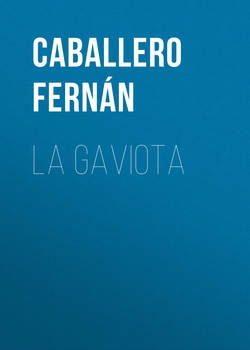Читать книгу La Gaviota - Caballero Fernán - Страница 1
PREFACE, BY THE TRANSLATOR
ОглавлениеGAVIOTA (sea-gull) is the sobriquet which Andalusians give to harsh-tongued, flighty women of unsympathetic mien and manners; and such was applied to the heroine of this tale by a youthful, malicious tormentor – Momo.
Fernan Caballero is, indeed, but a pseudonym: the author of this novel, passing under that name, is understood to be a lady, partly of German descent. Her father was Don Juan Nicholas Böhl de Faber, to whose erudition Spain is indebted for a collection of ancient poetry. Cecelia, the daughter of Böhl de Faber, was born at Morges, in Switzerland, in 1797, and subsequently married to a Spanish gentleman. Indeed, since the death of her first husband, she has successively contracted two other marriages, and is now a widow.
We have it on the authority of the Edinburgh Review, that the novels of this gifted authoress were “published at the expense of the Queen.” The same authority remarks, “Hence it might have been foretold, that of the various kinds of novels, the romantic and descriptive was the least repugnant to the old Spanish spirit; and that in order for a writer successfully to undertake such a novel, it would be necessary for him to have a passionate attachment to the national manners and characteristics, and a corresponding dislike to the foreign and new – such are the qualities we find united in Fernan Caballero: La Gaviota is perhaps the finest story in the volumes.” Its advent is a real literary event: the most severe critics have dissected this new work, and have unhesitatingly proclaimed the authoress to be the Spanish Walter Scott. Among the painters of manners, the best, without doubt, are the Spanish writers. We are certain to find there truth, joined to a richness and piquancy of details; and, above all, a spirited tone, which singularly heightens and sets off their recitals. They have, however, what in us is a defect, but with them a natural gift —the being a little prolix.
In translating it is easy to avoid this prolixity. This has been attended to in the present translation. I have preserved all the character of truth and originality of this novel; curtailing only such passages as seemed, in my judgment, too long and tedious for those who are not initiated into those agreeable familiarities of Spanish intimate conversation, and others, which are without attraction to those who were not born under the bright sun of Iberia. In regard to the translation, I would again quote from the review of it by the “Edinburgh Review:” “One quality which distinguishes their talk it is impossible to give any notion of in translation, and that is the enormous quantity of proverbs, in rhyme or in assonance, with which they intersperse their speech; and even when they are not actually quoting a proverb, their expressions have all the terseness of proverbial language.”
In rendering into English the ballads and other poetry, so profusely interspersed throughout this novel, I had to decide between the preservation of the original thoughts and ideas, in all their quaintness and integrity, and wrest from my translation that poetic elegance which, as English poetry, I could have wished to have clothed it in; or to abandon all the original, save the mere text, and write independent stanzas in English, as though I had composed original poetry, borrowing only the thought from the Spanish text. My habitual desire, in all my translations, being to preserve the original sense in its fullest force, I adopted the former of these two views; and thus, while the reader will find no poetic beauty, he will have before him the entire original thoughts. The translation of any foreign poetry into chaste and elegant English verse is acknowledged to be a very difficult task. At the end of this volume are four specimens, to satisfy the curious, of a strictly literal verbal translation of short poetic sprinklings towards the conclusion of the tale.
A writer remarks, on the Andalusian character: “Seeing nothing about them but a smiling fertility, the hierarchy of the Catholic Heaven are to them beneficent beings, to be approached with trust and confidence, and the familiarity with which they speak of God, the Saviour, the Virgin, and the saints, must not be mistaken for irreverence; on the contrary, it springs from the belief that they are really the favored sons of the faith, and from the vividness with which they realize the existence and beneficent watchfulness of their Divine protectors.”
And again. “There is hardly a bird, or a shrub, or an odor, about which the Andalusians have not some pious and simple legend. The white poplar was the first tree the Creator made, and therefore it is hoary, as being the oldest. San Joseph told the serpent to go on its belly, because it attempted to bite the infant Saviour in their flight into Egypt. Rosemary has its sweetest perfume and its brightest blossoms on Fridays, the day of the Passion, because the Virgin hung on a rosemary-bush the clothes of the infant Christ. Everybody loves the swallows, because they plucked out the thorns of our Saviour’s crown on the cross; while the owl, who dared to look impassively on the Crucifixion, has been sick and afflicted ever since, and can utter nothing but Cruz! Cruz! The rose of Jericho was once white, but a drop of the blood of the wounded Saviour fell on it, and it has been red ever since. Children smile in their sleep because angels visit them. When there is a buzzing noise in the ears, it is because a leaf of the tree of life has fallen.”
LA GAVIOTA. 1
1
Gaviota is the name of a sea-gull. It applies familiarly to the female scold, imprudent, stupid, and of harsh manners, indicated by the well-known proverb: “The sea-gull – the older she is, the louder she screams.”
